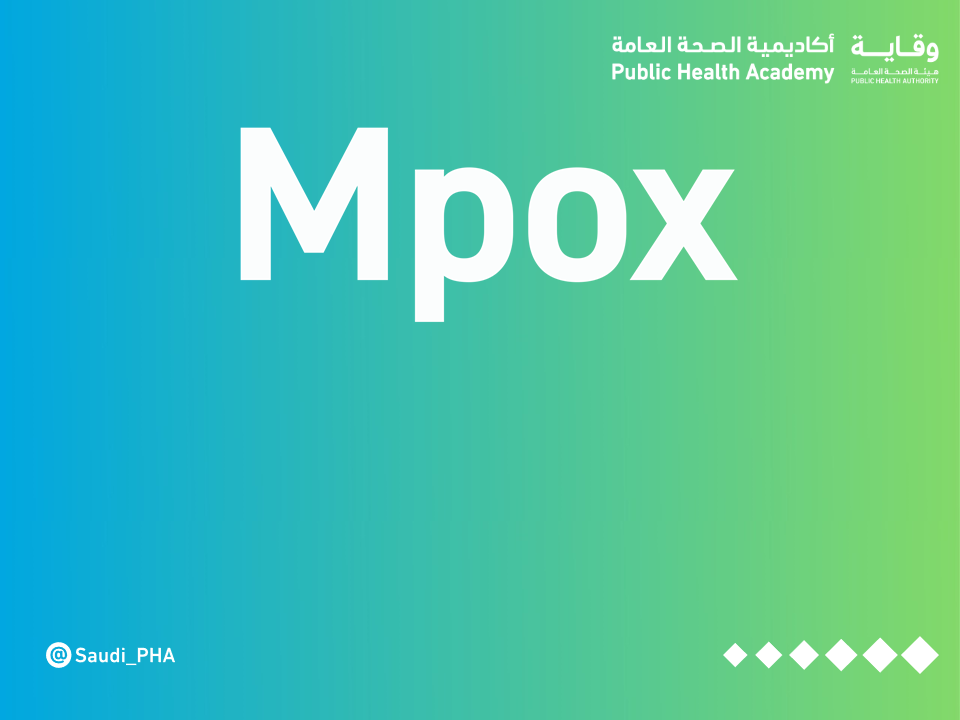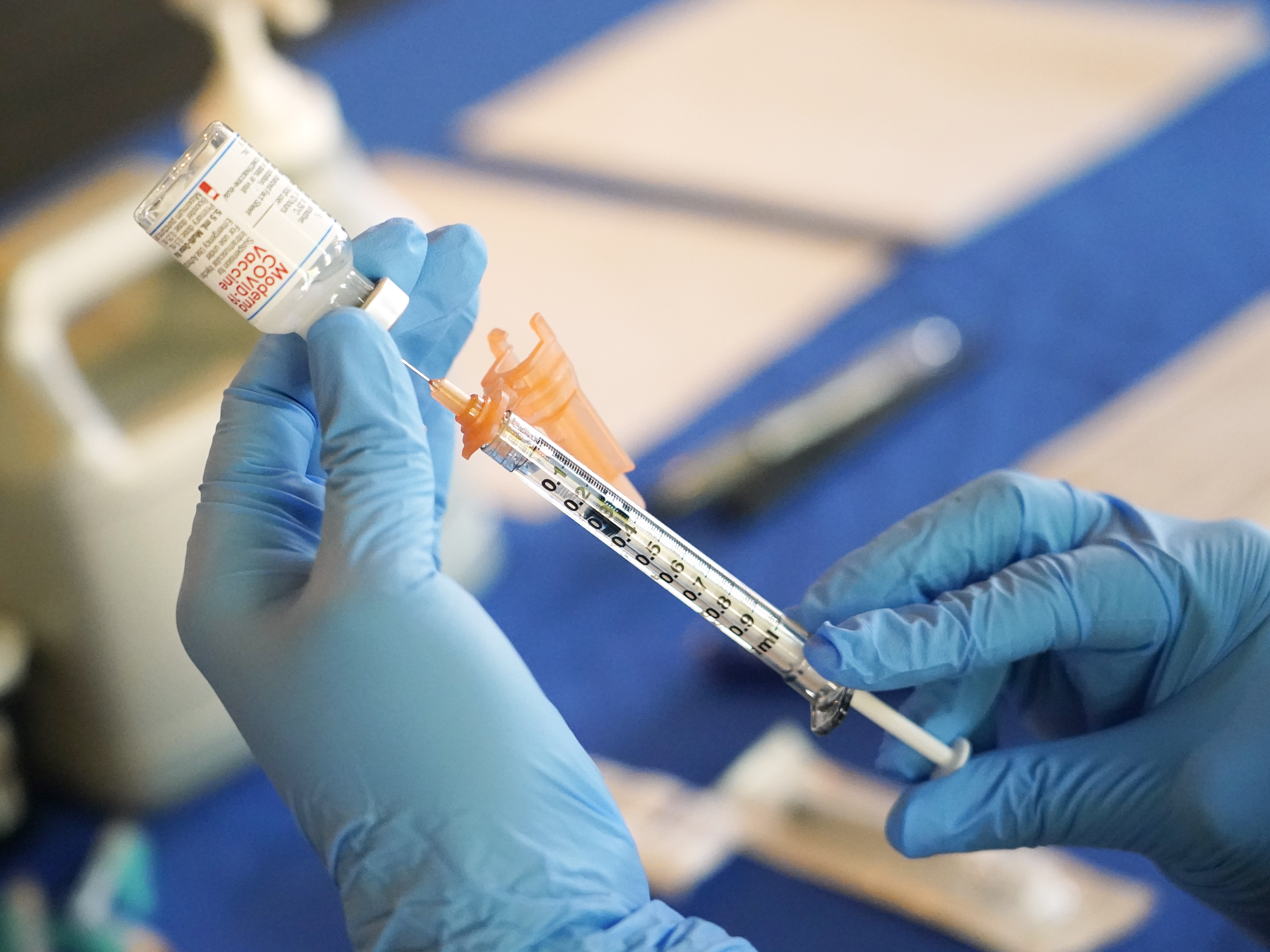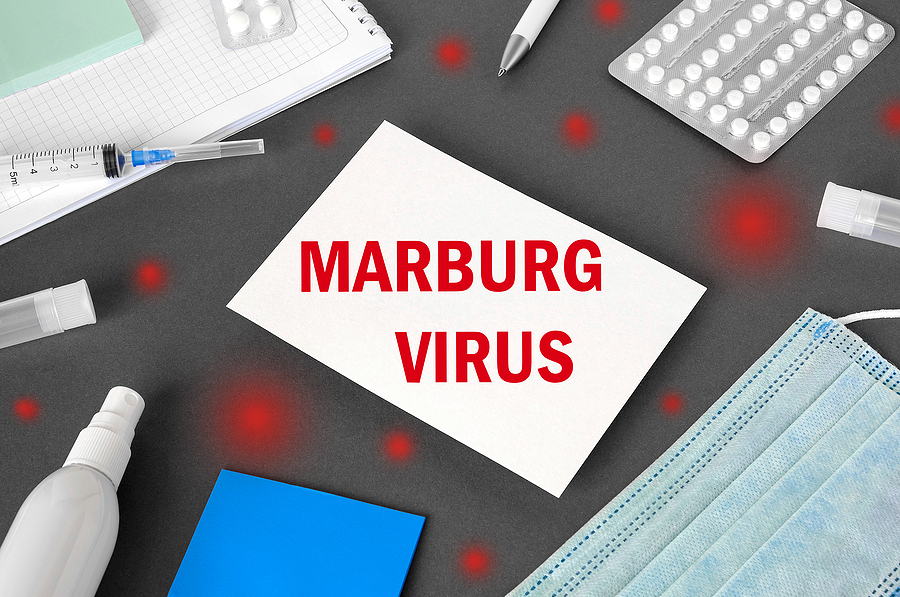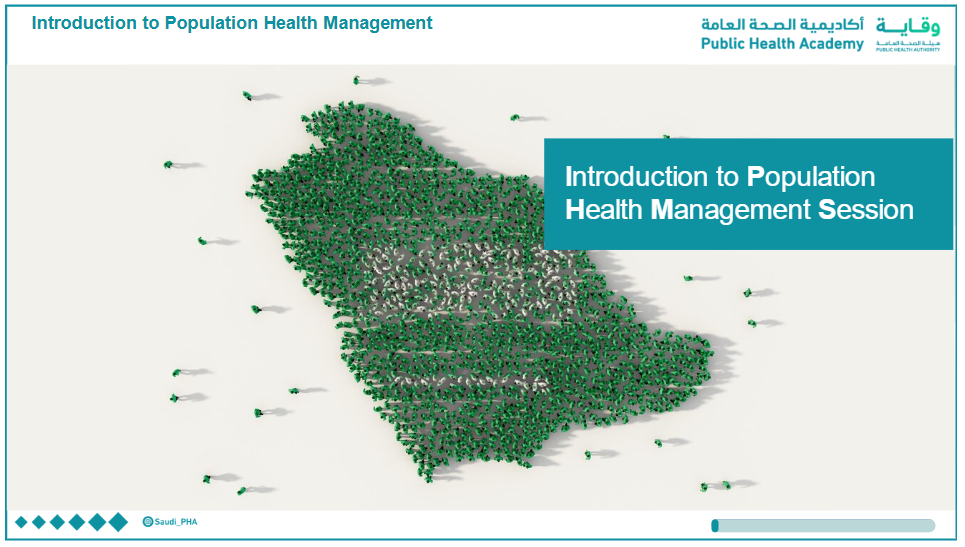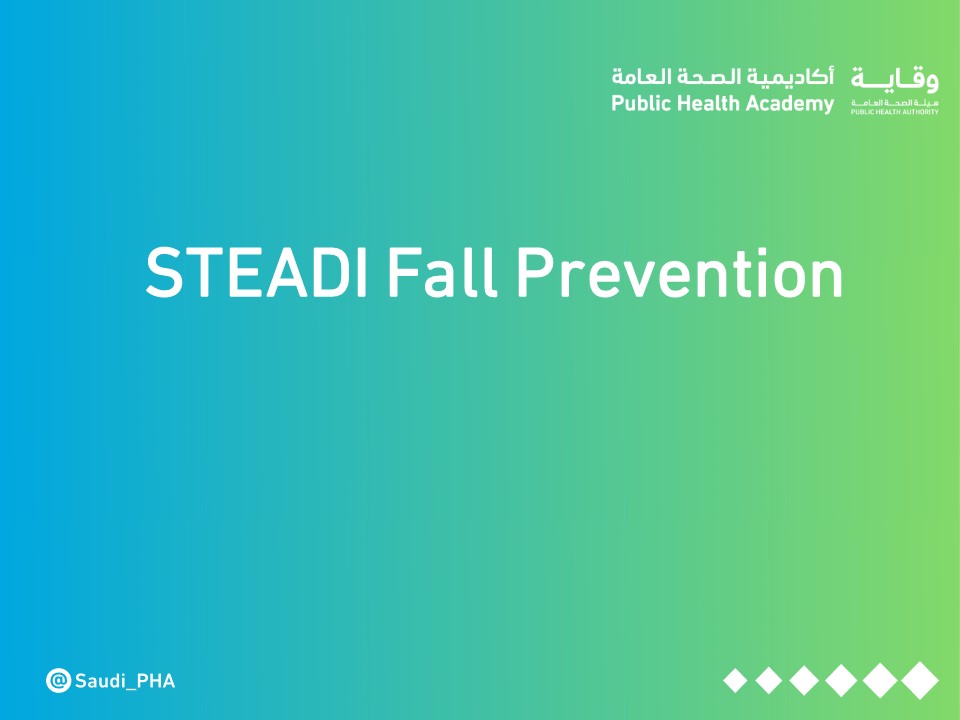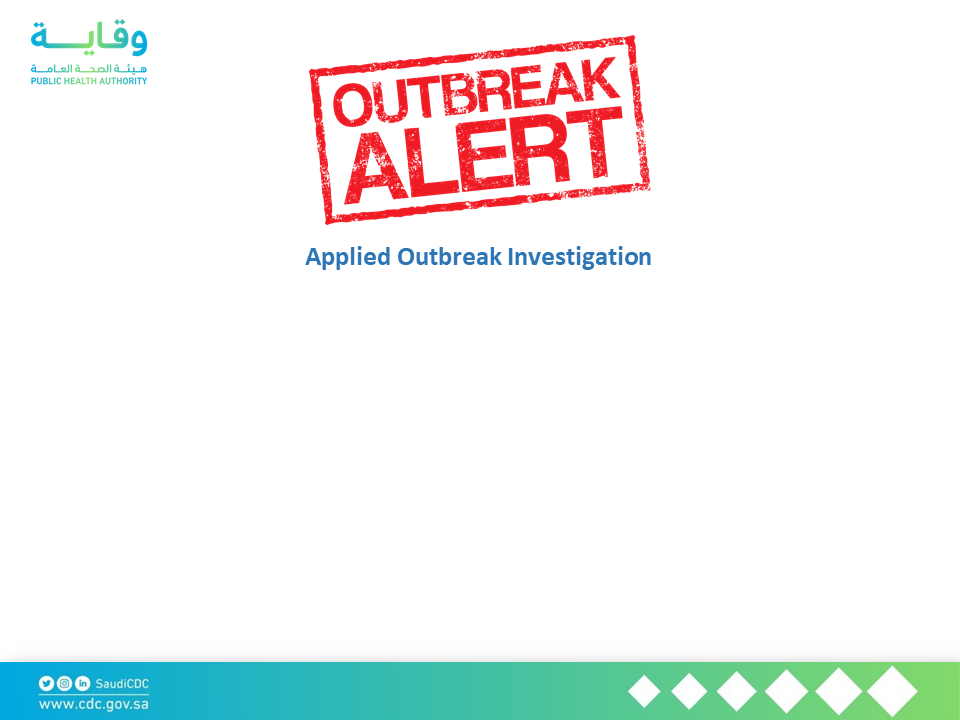
AOI 101
Applied Outbreak Investigation
Welcome to the Applied Outbreak Investigation training! In this training, we will cover 11 steps to investigate a foodborne illness outbreak. In a real-life situation, these steps might happen in a different order, or steps may occur simultaneously. Participants will also work through an outbreak scenario using skills learned during each module.
Each outbreak step has:
● Module objectives
● Short videos covering the related concepts.
● Knowledge check questions
● A case study scenario
We recommend that you work through the case study as you complete each module. But if it is completed separately from the training, it should be completed in the chronological step order as the information builds upon itself.
Course
Objectives:
●
Define a foodborne outbreak.
●
Describe when a foodborne outbreak investigation is necessary.
●
Demonstrate how to investigate an outbreak.
●
Describe the roles and responsibilities of epidemiology, environmental
health, and laboratory in an outbreak investigation.
●
Identify available tools and resources.
●
Describe how to document and report on outbreak findings.
●
Identify communication strategies to employ during an outbreak.
Descriptive Analytics in Public Health Using R
Course Title:
"Descriptive Analytics in Public Health Using R"
Course Description:
This course is designed to equip students with the skills to apply descriptive analytics in the field of public health using the R programming language. The focus is on leveraging R's powerful tools for data manipulation, visualization, and analysis to make informed decisions in public health contexts.
Key Modules:
1. Introduction to R for Public Health: Familiarize with the R environment, basic syntax, and data structures. Understand the relevance of R in public health data analysis.
2. Data Management in R: Learn how to import, clean, and manipulate public health data using R. This includes dealing with various data formats and managing large datasets.
3. Descriptive Analytics Fundamentals: Understand the principles of descriptive analytics. Focus on summarizing and describing public health data to identify patterns, trends, and relationships.
4. Visualization Techniques in R: Master the art of visualizing public health data using R's ggplot2 and other visualization packages. Learn how to communicate data findings effectively through graphs and charts.
5. Case Studies in Public Health: Apply the learned concepts in real-world public health scenarios. Analyze datasets to identify health trends, assess population health needs, and support public health policies.
Learning Outcomes:
By the end of this course, students will be proficient in using R for descriptive analytics in public health. They can effectively manage, analyze, and visualize public health data, providing actionable insights for healthcare decision-making. This course structure ensures a comprehensive understanding of both the technical aspects of R programming and the practical application of descriptive analytics in public health.
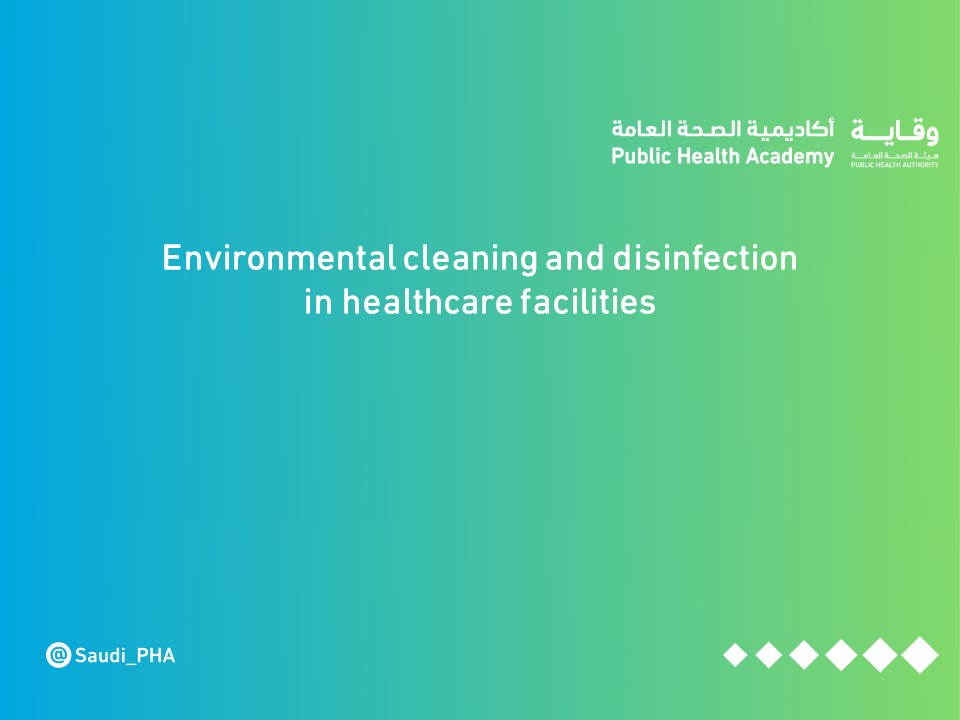
EC101
Environmental cleaning and disinfection in healthcare facilities
Welcome to Environmental cleaning and disinfection in healthcare facilities
By the end of this course, you will be able to:
- Understand principles of environmental cleaning and disinfection in healthcare.
- Demonstrate knowledge of environmental cleaning techniques.
- Describe cleaning and disinfection techniques for different hospital areas.
- Explain proper cleaning methods for specific pathogens and additional techniques.
- Discuss strategies for monitoring and assessing environmental cleaning effectiveness.
Target audience:
IP Director, Infection preventionists and operating companies for cleaning in hospitals.
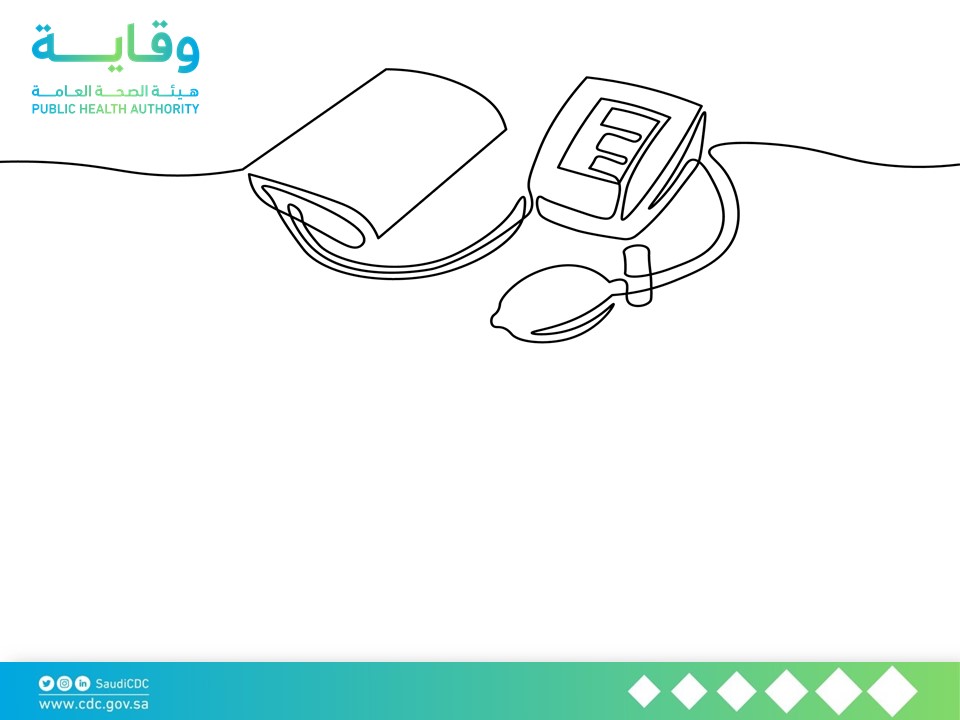
HIP 101
Health Promotion & Prevention Strategies for Hypertension
Objectives:
- Gain comprehensive knowledge of the fundamental principles underlying hypertension and its etiology.
- Acquire a thorough understanding of the various risk factors associated with hypertension.
- Demonstrate proficiency in the accurate measurement and classification of hypertension.
- Appreciate the significance of hypertension screening and its role in early detection and intervention.
- Comprehend diverse preventive strategies for hypertension at the individual level.
- Evaluate the array of preventive strategies for hypertension at the policy level.
- Develop a comprehensive understanding of the different approaches to promoting adherence to medication and lifestyle interventions for hypertension.
Target Group:
health care practitioners
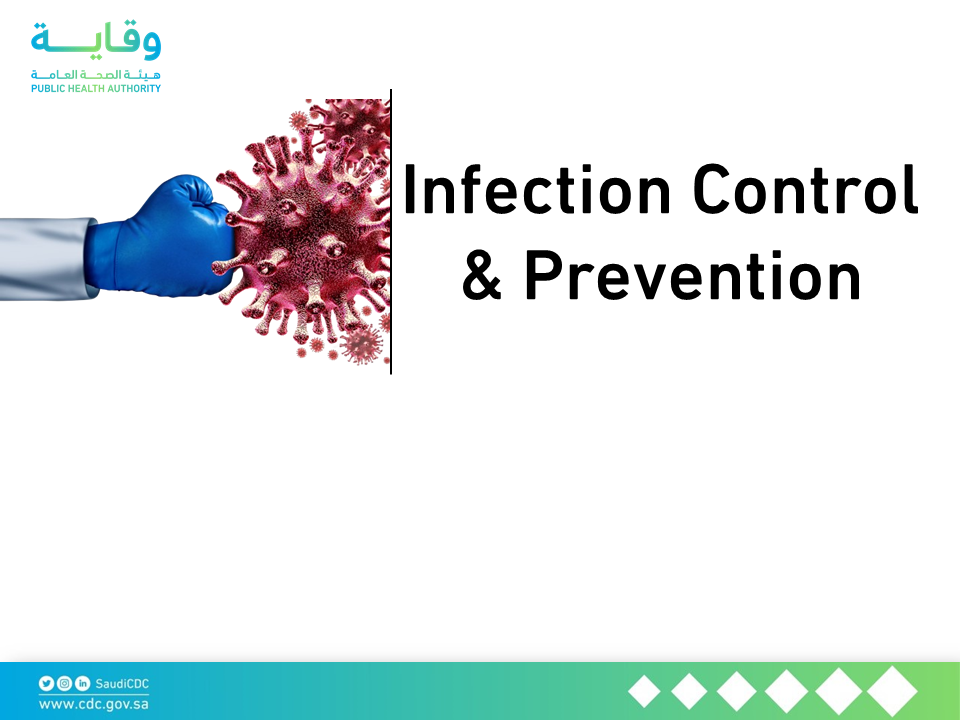
IPC 101
INFECTION CONTROL & PREVENTION
Infection control and prevention refers to the measures and practices implemented to minimize the risk of spreading infections in various settings, such as healthcare facilities, workplaces, and communities. It involves a range of strategies aimed at reducing the transmission of infectious agents, including viruses, bacteria, and other pathogens.
Introduction to Public Health Laboratories (PHLs)
Course Description:
This course provides a comprehensive introduction to public health laboratories, highlighting their foundational components, operational systems, and critical contributions to public health. It is designed for new public health laboratory professionals, students, and anyone seeking a comprehensive understanding of public health laboratories.
Participants will gain insights into the historical evolution, core functions, and specialized roles of public health laboratories, including their impact on disease prevention, outbreak response, and policy development.
Course Objectives:
By the end of this course, participants will be able to:
- Understand the core components and systems of public health laboratories:
- Identify the multifaceted roles of public health laboratories:
- Analyze the importance of partnerships and collaboration:
- Examine advanced diagnostic technologies and data management processes:
- Understand the laboratory's role in global health security and emergency preparedness:
- Recognize ethical considerations in public health laboratory practices
Target Audience:
This course is aimed at new public health laboratory professionals, students, and anyone interested in gaining a comprehensive understanding of public health laboratories and their critical role in public health.
HCV101
Overview and Progress Update of Hepatitis C
Table of contents
- Objectives
- Introduction
- Symptoms and transmission
- Hepatitis C Situation
- Case detection and diagnosis
- Reporting
- Treatment
- Global Health Strategy
Overview and Progress Update of Sexually Transmitted Infections (STIs) Globally and in Saudi Arabia
Course Description:
This course offers a comprehensive overview of sexually transmitted infections (STIs), focusing on global trends and the current situation in Saudi Arabia. It is designed for healthcare professionals, public health practitioners, and anyone interested in understanding the impact of STIs on public health.
Participants will explore the latest developments in STI prevention, treatment, and control, while gaining valuable insights into the epidemiological trends, challenges, and progress made in addressing STIs both globally and within Saudi Arabia.
Course Objectives:
By the end of this course, participants will be able to:
-
Understand the global epidemiology of STIs.
-
Analyze the current status of STIs in Saudi Arabia.
-
Recognize the key challenges in STI prevention, diagnosis, and treatment.
-
Identify progress and initiatives addressing STIs at the global and national levels.
-
Identify the Current Practices in STI Case Detection in Saudi Arabia.
Target Audience:
The course targets individuals interested in public health, healthcare practitioners, and anyone involved in the field of sexually transmitted infections.
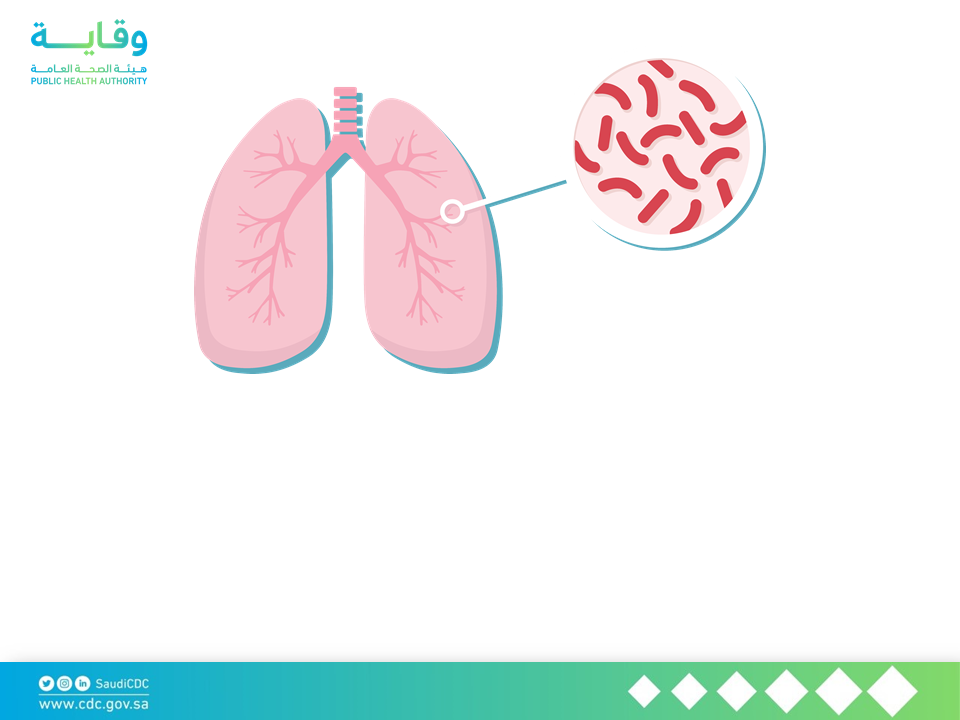
TB 101
Overview and Progress Update of Tuberculosis
Participant will be able to:
- Recognize the current situation of tuberculosis(TB) locally and globally
- Describe the epidemiology of TB and the recent trends in TB.
- Demonstrate knowledge of recent advancements in the diagnosis and treatment of the disease.

PHB 101
Public Health Basics Package
Public health basics package includes:
- Introduction to Public Health.
- Introduction to Epidemiology.
- Introduction to Biostatistics.
- Introduction into Clinical Research.
- Introduction to Report Writing.
- Introduction to Questionnaire formulating.
PHIE
Public Health Interventions in Emergencies
Public Health Interventions in Emergencies
Public health interventions differ greatly depending on the nature, scope and type of disaster, the availability of resources, and the social, political and economic characteristics of each affected community. Knowing common interventions and when to use them is critical for decision makers, public health professionals, humanitarian workers and disaster managers. This course follows the international guidelines and standards that are modified to meet the regional context and local characteristics of the Kingdom of Saudi Arabia. A large portion of this course will focus on surveillance, outbreak investigation and other cost-effective interventions with special approaches, techniques and tools that are adapted to suit emergency situations. This course integrates adult learning principles by incorporating case studies, real-life examples, questions, and interactive sessions wherever feasible.
By the end of this session, the participants will be able to:
- Identify the emergencies that face countries, particularly the Kingdom of Saudi Arabia.
- Identify the public health risks and consequences associated with emergencies
- Identify cost-effective interventions in responding to public health emergencies
- Understand the role of epidemiology in emergency management.
- Understand the type, structure and function of surveillance systems during emergencies.
- Conduct outbreak investigation in emergency situations.
- Conduct health needs assessments.
- Understand risk management
- Describe the key components of essential health services in emergencies and prioritize interventions to ensure accessible and continuous care for vulnerable populations.
- Make plans to keep primary and secondary care levels and referral services functioning during emergencies.
- Understand the logistics requirements of medical and humanitarian aid provision during emergencies.
- Explain the importance of Health Information Systems and their components.
- Identify essential WASH needs in emergency settings and outline effective interventions to prevent waterborne diseases and promote hygiene among affected populations.
- Explain the importance of mental health and psychosocial support in emergencies and identify appropriate interventions to address the psychological needs of affected individuals.
- Assess the impact of emergencies on food security and design basic nutrition programs to address malnutrition in affected communities.
- Develop effective health messages and utilize diverse communication channels to inform and educate affected populations on health risks and protective actions during emergencies.
Front Line Public Health Practitioners
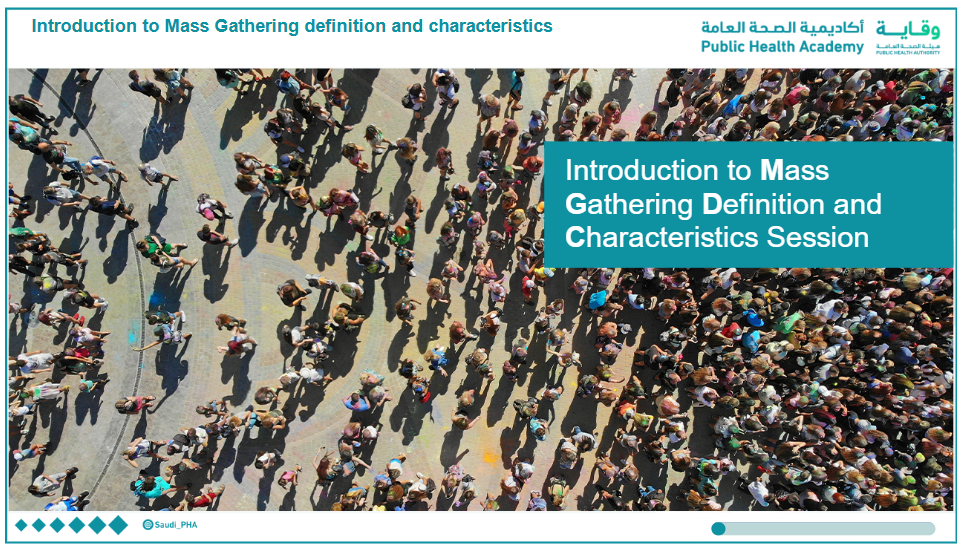
PHIMG
Public Health Interventions in Mass Gatherings
Public Health Management of Mass Gathering Events
Mass Gathering (MG) has been defined by the World Health Organization (WHO) as an occasion, either organized or spontaneous where the number of people attending is sufficient to strain the planning and response resources of the community, city, or nation hosting the event. Public health concerns which arise during such conditions include injury, communicable diseases, non-communicable diseases, exhaustion and heat-related illnesses among others. Public health workers aim to minimize these risks through gaining a better understanding of public health threats, strengthening of public health systems, and enabling of evidence-based decision-making. Furthermore, there is a demand to enhance preparedness, optimize surveillance, and develop rapid response capacities.
By the end of this session, the participants will be able to:
- Define mass gatherings and identify their unique characteristics and challenges on a global and regional level
- Identify the main public health concerns during mass gathering events
- Understand and apply the International Health Regulations (IHR) as they pertain to managing public health at mass gatherings.
- Describe the types and scope of mass gathering events in Saudi Arabia, particularly focusing on the Hajj and Umrah
- Conduct risk assessments for mass gatherings utilizing the right tools and prioritize needed health and safety interventions
- Identify the components of public health surveillance tailored to the specified needs and risks of different types of mass gathering events Grasp and apply various public health interventions specific for mass gathering
- Apply effective risk communication and community engagement strategies
- Implement environmental health and sanitation measures including addressing water safety, food hygiene, and waste management
- Collaborate effectively with various stakeholders, including healthcare providers, event organizers, and emergency services.
Professionals who have a role to plan and/or implement activities that aims to detect, prevent, and control public health events Mass Gatherings in Saudi Arabia. Preferable mid-level professionals and Rapid Responders
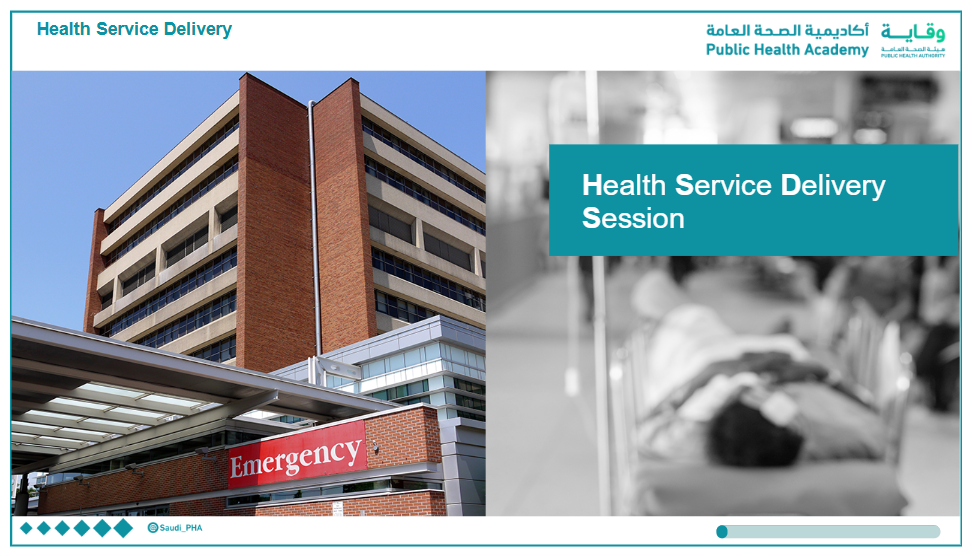
PHSSP
Public Health Support Skills Package
Public Health Support Skills Package
The Public Health Support Skills course is designed to empower participants with essential skills for effective leadership, management, and communication in public health settings. This comprehensive course integrates theoretical foundations, various leadership skills, and practical tools to support decision-making, program planning, resource management, and team development. By addressing key aspects such as health policy, stakeholder analysis, conflict resolution, and stress management, this course equips participants to navigate the complexities of public health systems and deliver impactful results.
Upon completion of this course, participants will be able to:
- Analyze health policies and adapt organizational strategies to improve service delivery.
- Apply organizational management theory in public health practice.
- Identify and apply various leadership styles and theories to influence and motivate teams in public health contexts.
- Develop and implement effective project management plans, ensuring optimal allocation and utilization of resources.
- Design evidence-based health programs that meet community needs and evaluate their effectiveness.
- Assess the roles and interests of stakeholders to foster collaboration and achieve program objectives.
- Implement change management strategies to enhance organizational performance and adaptability.
- Apply structured problem analysis techniques to identify challenges and craft actionable solutions.
- Foster a cohesive team environment and enhance interpersonal communication to achieve shared goals.
- Conduct self-assessments to identify personal strengths and areas for growth while resolving conflicts effectively.
11. Develop strategies to prioritize tasks, enhance productivity, and manage stress for personal and professional well-being.
· Public health leaders and managers,
· Public health practitioners.
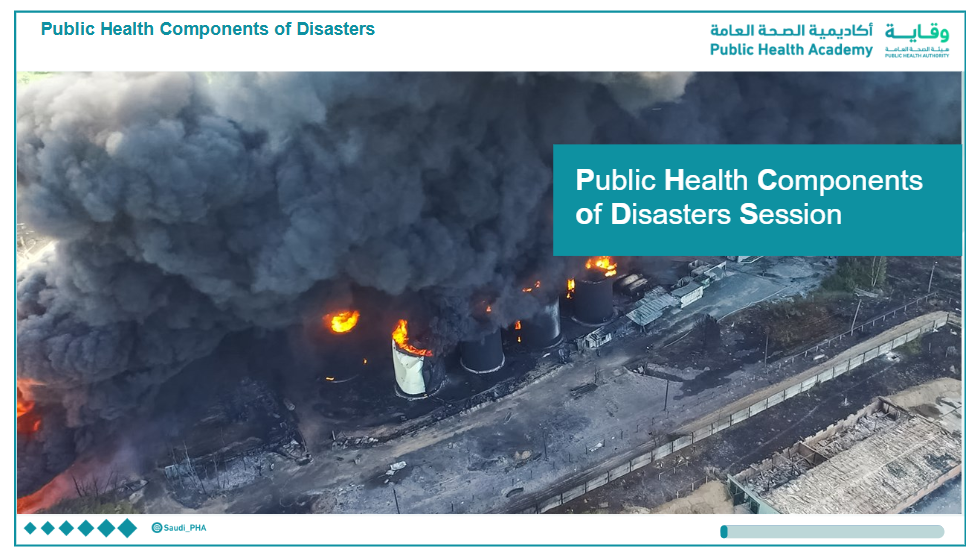
RMTTCC
Risk Management Tools and Techniques in Challenging Conditions
Risk Management Tools and Techniques in Challenging Conditions
Public health is impacted by a wide spectrum of physical, chemical, and biological hazards. People's health and lives become at risk when they interact with people and health system vulnerability factors. In order to minimize those risks, robust risk reduction measures need to be taken. However, risk reduction cannot be achieved without understanding the causes and influencing factors. Hence, risk assessment, including risk determinants, is crucial for any risk management plans and projects. This course provides field-oriented, locally adapted training that presents suitable tools and techniques to conduct risk assessments and develop risk management plans.
By the end of this session, the participants will be able to:
- Discuss the common public health risks in the region and globally
- Conduct effective risk assessments to determine potential impacts.
- Understand the process and approaches of hazard, vulnerability, and capacity assessment
- Utilize a range of tools and frameworks to manage risks effectively in uncertain environments.
- Demonstrate the development of risk reduction plans
- Develop and prioritize actionable strategies to reduce or control risks.
- Discuss the cost of risk management options.
- Communicate risk information clearly and effectively to various stakeholders.
- Effectively handle data in the acute phase of emergencies from collection to dissemination.
All public health professionals who are involved in assessing, planning, and implementing risk management interventions. The audience are those who execute the risk management functions as well as the manager of public health emergencies.

SCPG
Saudi Clinical Preventive Guideline
The Saudi clinical preventive guideline is a comprehensive resource designed to provide family medicine and preventive medicine physicians with evidence-based recommendations for preventive care across all age groups.
This training program will aim to equip participants with the skills and knowledge necessary to accurately define the components of the guideline and to apply it in their clinical practice.


